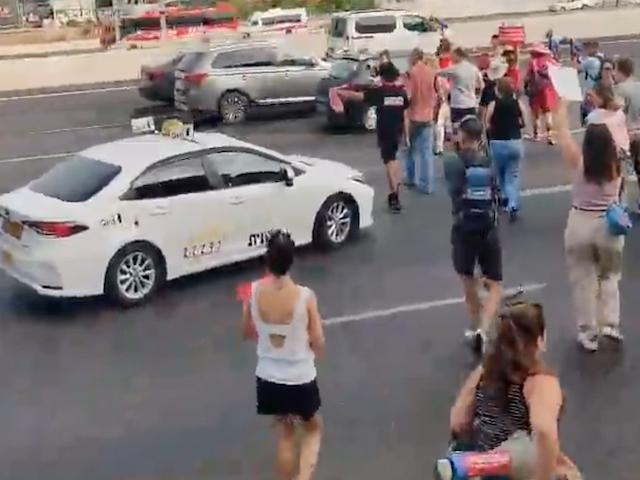In an extraordinary and unprecedented display of public dissent, families of hostages currently held in the Gaza Strip joined a massive protest on Thursday, marking the fifth day of what organizers have boldly declared a "week of resistance." The demonstrators, driven by a blend of anguish and determination, have turned the Ayalon highway, the lifeline of Tel Aviv, into a dramatic stage of civil unrest, causing significant traffic disruptions and drawing nationwide attention.
A City Brought to a Standstill
In a rare and striking daytime spectacle, the protesters overwhelmed the main artery of the Tel Aviv area. The sheer number of demonstrators blocking the highway created chaotic traffic jams that echoed the urgency and desperation of their cause. Their chants and banners called for Israel to agree to a ceasefire deal with Hamas, proposing an exchange of Israeli captives, taken during the horrific events of October 7, for Palestinian terrorists held in Israeli prisons. These hostages have endured unimaginable hardships, held by Gazan terrorists for an agonizing 258 days.
Families of the hostages block the Ayalon Highway in Tel Aviv this morning saying they will not give up until the government makes a deal to free their loved ones from captivity in Gaza.
— Luc Bernard (@LucBernard) June 20, 2024
Credit Aviv Atlas pic.twitter.com/O1CCC0aER7
Calls for Political Change Amid Turmoil
The demonstrators’ demands extended beyond the immediate crisis. Galvanized by the recent resignation of Benny Gantz, leader of the Blue and White party, from Israel's war cabinet, they also called for fresh elections. Gantz’s departure has added a layer of political complexity to an already volatile situation, intensifying the calls for new leadership and a reassessment of the nation’s direction.
Controversial Allegations and Police Response
Likud lawmaker Nissim Vaturi has inflamed tensions further by labeling the protest movement "an arm of Hamas," a statement that has sparked significant backlash from supporters and opposition alike. Critics argue that such accusations are not only unfounded but dangerously divisive. The response by police to these protests has also come under severe scrutiny, with opposition lawmakers and Israeli medical associations condemning the authorities for what they describe as overly harsh tactics.
איילון צפון חסום. משפחות החטופים לא יוותרו לעולם: ״העסקה נופלת - המדינה בוערת!״. קרדיט אביב אטלס pic.twitter.com/lmwENw36RK
— לירי בורק שביט (@lirishavit) June 20, 2024
A Former Hostage’s Change of Heart
Adding a poignant and heart-wrenching layer to the ongoing saga, Ada Sagi, a former peace activist who was kidnapped by Hamas on October 7 and later released, has dramatically shifted her perspective on the prospects for peace. In a deeply emotional interview with the BBC, Sagi recounted her harrowing ordeal and expressed a profound change in her views.
"I don't believe in peace, no. I don't believe, sorry," Sagi declared, her voice resonating with the pain of her experience. "I understand Hamas don't want it." She emphasized the urgent need for Israel to negotiate the return of all hostages, both living and deceased.
A Tale of Survival and Disillusionment
Sagi detailed her captivity, beginning with her initial confinement in a house filled with children and her subsequent transfer to Khan Younis. She revealed disturbing insights into the economic realities of Gaza, noting that her captors mentioned receiving 70 shekels a day for each hostage—a significant sum in a region plagued by poverty and unemployment.
“I used to think Palestinians were good people, like you and me... After Oct. 7, I realized I was wrong.”
— Jewish News Syndicate (@JNS_org) June 19, 2024
Former Hamas hostage and former peace activist Adi Sagi tells BBC.#bringthemhome
https://t.co/bML8nbeTEE
Her disillusionment extends to the broader narrative surrounding the conflict. "People say that they are not involved. They're involved... and getting money for each of us," she asserted, challenging the notion that ordinary Gazans are mere bystanders in the ongoing strife.
During the tense days of hostage releases in November, Sagi described the constant fear and uncertainty that plagued her. "Every knocking on the door you think there is somebody coming to take you," she recalled. The day before her eventual release, she was taken to Khan Younis and held in Nasser Hospital, a detail corroborated by other former hostages despite denials from the hospital's director.
A Community in Ruins
Sagi’s emotional scars are compounded by the physical devastation she and her community have suffered. "I lost my home. I lost my freedom - the whole place that I [have] to go back. Our village - kibbutz - is destroyed," she lamented, her words capturing the profound sense of loss felt by so many.
"I don't believe in peace. Sorry. I changed my mind."
— Ruth (@Yeshuavolgeling) June 19, 2024
That was the tearful conclusion offered by Adi Sagi in an interview today with the BBC.
Adi Sagi was taken hostage by Hamas on Oct. 7, and set free as part of the ceasefire deal in November, after 53 days of captivity. pic.twitter.com/LHQANc4Vot
Conclusion
The protests and the voices of those like Ada Sagi underscore the complex and deeply personal dimensions of the conflict. As Israel grapples with the demands for immediate action and long-term solutions, the nation's leadership faces an unprecedented challenge: to navigate these turbulent waters with compassion, justice, and a clear vision for the future.


